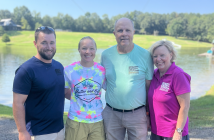When the Association for Challenge Course Technology (ACCT) launched its Operation Accreditation Program in 2020, the goal was not only to highlight programs that meet ACCT’s procedural and standard compliance requirements, but also—in the words of former executive director Shawn Tierney—create an “exceptional credentialing program for operators of challenge courses, raising the bar of performance and risk management.”
Two years later, just an octet of adventure parks have cleared the high bar of external review and documentation required for ACCT accreditation—four in the U.S. and four in Singapore—and several more are in the process of seeking their Operation Accreditation Program certificates as of September 2022.
That’s a mere fraction of the adventure parks eligible for accreditation, but backers of the program remain optimistic the list of accredited programs will grow as operators become more comfortable with the ACCT review process, and more convinced of the value of accreditation, both to an operation itself and in the eyes of third-party stakeholders, including customers and insurers.
French Broad Adventures was the first park to receive ACCT accreditation in July 2022; not coincidentally, owner Korey Hampton is also ACCT’s board secretary and heads the ACCT committee in charge of the accreditation program. Of the program, she says, “We wanted to develop a process by which programs could demonstrate their quality.”
CHALLENGES AND REQUIREMENTS
Requirements for achieving ACCT accreditation are substantial. In addition to filing an application and paying a $500 application fee, programs must undergo both a course inspection and operational review—at the program’s expense—as well as provide an affidavit showing that their employee training program meets ANSI/ACCT standards.
Structural inspections can be done by an ACCT certified ICE inspector or a licensed engineer; operational reviews for accreditation must be performed by a reviewer certified by ACCT, which maintains a list of qualified reviewers on its website. Many jurisdictions (as well as insurers) require annual structural inspections, of course, so this piece of the accreditation puzzle is usually not an additional expense. The operational review is a new wrinkle for most operations, though, and often a high hurdle.
Worth the cost. Yet, the operational review can be especially valuable, precisely because most operations don’t do them. “Part of the benefit of this is having a review of your procedures and getting suggestions for improvements,” says Hampton. “One of the best things we’ve ever done is have an operational review.”
Hampton says that while it’s possible for programs to fail at accreditation, it’s not likely. “Right now, it’s a self-selecting group of programs that know they have their ducks in a row and know they will get certified,” she says. In addition, “If any of the three legs of the process [structural inspection, operational inspection, training]fails, just don’t submit the application—you can remediate before you submit,” she says.
ACCT estimates that the entire accreditation process can take between two and six months. “If you miss the mark, we can reassess,” says Hampton, who also is an ACCT-certified operational reviewer.
Once accredited, programs must seek reaccreditation every three years, which requires documentation including an annual report, insurance verification, and accident reports. It also requires another operational review. And additional annual fees are required to keep accreditation current.
A LEARNING EXPERIENCE
Going through the accreditation process has been a learning experience as well as an opportunity to make improvements, says Callie Murphy, assistant general manager at the Adventure Center of Asheville, N.C., one of the programs currently seeking ACCT accreditation.
New efficiencies. Among other things, the accreditation process prompted the Adventure Center of Asheville to revamp its emergency preparedness program and improve how incident reports are filed and followed.
“We were already doing a lot of the things that were required, but our paperwork was lacking,” Murphy says. “Going through all of this allowed us to realize we could do things differently and be more efficient.”
The park spent the summer months preparing to submit its accreditation paperwork; the operational review is scheduled for the fall, and the full process will likely take more than a year from start to finish, says Murphy.
“It’s like eating an elephant—one bite at a time,” she says. “It’s not going to be a quick turnaround for most companies.”
Added value. “I don’t know if it will allow us to attract new or different guests, but accreditation will be valuable for us as managers,” says Murphy. “We’re not going to stay in one place forever, but we will have this documentation and procedures in place for the next person.”
The process also sharpened the managers’ awareness of the ANSI/ACCT standards. Murphy says the requirement for an operational review made managers ask themselves, “When was the last time we read the ACCT standards?”
Standards compliance. And that’s a key step. “Make sure everything in the [ACCT standards] book is being done at your course,” Hampton advises programs considering getting accredited, because the operational review “is an objective, line-by-line evaluation based on those standards. There are no surprises whatsoever.”
Putting on her inspector’s cap, Hampton adds, “If you read those standards, you know what I’m going to ask you.” Key Benefits
What else do parks get for their efforts? For one thing, the programs are highlighted on the ACCT website. For another, the parks are permitted to display an accreditation badge in their own marketing materials and onsite. Public awareness of ACCT accreditation is still a work in progress, but the badge nevertheless provides a new level of assurance to visitors.
Customer assurance. “By hanging that shingle out, it tells our customers that we’re doing everything we can to make sure that this adventure they’re about to go on with their family is safe,” says Hampton. Down the road, that could be a competitive advantage in regions with a healthy share of aerial operations.
Insurance discount. Another tangible benefit for programs that successfully navigate the process is a big discount on their liability insurance. Cameron Annas, CEO of Granite Insurance, which provides coverage to many adventure parks, said accredited programs can expect to get about a 10 percent discount.
“It definitely has credibility to it,” Annas says of the ACCT accreditation process, adding: “In the past 10 to 15 years, we’ve placed so much attention on structural inspections. Most claims, though, don’t happen for structural issues, but operational issues. So, this is beneficial for everyone.”
Looking ahead. Annas predicts that accreditation “will have a positive effect on claims and liability; it will be interesting to see the claims history in three years or so.”
The same can be said about the success of the operation accreditation program overall. It was developed over the course of several years, during which time industry members debated the merits of relatively rigorous requirements vs. simpler and less-costly ones. In the end, ACCT chose to set a high bar. Will accreditation nonetheless become a common goal, or remain limited to a relative few? The answer won’t be clear for at least a few more years.






